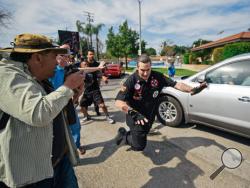LOS ANGELES (AP) — A Ku Klux Klan leader who was injured when his small group of demonstrators brawled with counter-protesters in a Southern California park this weekend said Monday that he called police beforehand asking for security and was told, "We don't do that."
Will Quigg said in an interview with The Associated Press that he contacted the Anaheim Police Department but that the agency denied his requests for a police presence. The KKK then told officers that the group would hire an outside security company.
"They said, 'No, you can't do that either,'" Quigg said.
The Police Department is facing scrutiny for its response after three people were stabbed and several others were injured in the melee Saturday involving several dozen people and spanning a city block. Investigators determined that Klan members acted in self-defense after the counter-protesters attacked.
On Monday night, some 300 people took part in a candlelight vigil and "peace protest" in the same park. The group marched from Pearson Park to City Hall, and although the gathering got loud at times, police Sgt. Daron Wyatt said it remained peaceful.
"There were some people from Saturday's protest who showed up at the end and started yelling, but there was no violence and no need for police intervention," he said.
Organizers said they wanted to show that Anaheim is a peaceful, tolerant city.
The Police Department had notified the public ahead of Saturday's Klan gathering that the KKK planned to hold an anti-immigration protest at the park about 3 miles from Disneyland, but at least one witness said he saw no uniformed officers when the attack began.
When Quigg and about five others arrived they were confronted by dozens of angry counter-protesters.
Wyatt said officers were present, but he declined to say how many. He acknowledged that Quigg had contacted the department but believed that the group leader was asking for police to act as personal security guards.
"He was told how to contract for officers to do that, but did not want to spend the money," Wyatt said.
Eugene O'Donnell, a professor at John Jay College of Criminal Justice in New York, said the department's response about contracting officers is as if the KKK rally was the same as "an Oktoberfest or a New Year's Day event."
"It's their way of saying, 'We have no reason to believe there will be any trouble beyond the trouble you get at a rock concert," he said, adding police are obligated to ensure public safety.
Police departments are facing criticism for overpolicing, chilling free speech and being heavy-handed, O'Donnell said. That can make it difficult for officers to know how to handle a protest event.
"Sometimes the best presence is a very low key presence," he said.
Anaheim police said a plan was in place and officers at the protest quickly called for backup when the violence broke out. Additional officers arrived within less than two minutes.
"Officers rendered medical aid to those who were injured and arrested all but one of the suspects," the agency said in a statement.
Five KKK members arrested after the brawl later were released because evidence showed they acted in self-defense, police said. Seven people still in custody were seen beating, stomping and attacking the Klansmen with wooden posts, Wyatt said.
Police said the Klansmen stabbed three counter-protesters.
"Regardless of an individual or groups' beliefs or ideologies, they are entitled to live without the fear of physical violence and have the right, under the law, to defend themselves when attacked," a police statement said.
Quigg said he was thrown to the ground, hit with a pipe, stomped and struck with two-by-fours. He said his right hand was fractured and his spleen and a rib bruised. He said the left side of his chest is "black and blue and swollen up to the size of a softball."
Quigg said he did not stab anyone.
"What was done was done to protect our lives," he said. "Our lives were in jeopardy."
Like many other U.S. cities, Anaheim has a history intertwined with the KKK. In the 1920s, Klan members gained four of five City Council seats but were ousted after their affiliation became public.
The group's presence in the state is extremely small today, said Brian Levin, who directs the Center for the Study of Hate and Extremism at California State University, San Bernardino.
___
Follow Christine Armario on Twitter: http://www.twitter.com/cearmario .

